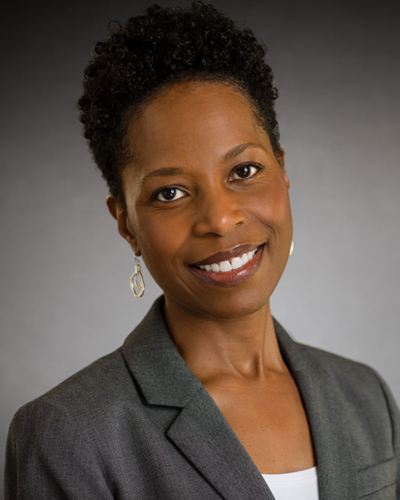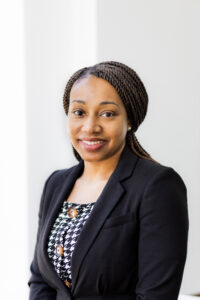Discussion Description:
Students earning the NCCU Law & Technology Certificate (LTC) must, in addition to completing legal tech coursework, complete 25 legal tech-related pro bono hours. NCCU Technology Law & Policy Center works with the NCCU Law Pro Bono program to provide opportunities for LTC students to earn their pro bono hours. The first coordinated pro bono project allowed students to earn tech-related pro bono hours by preparing Gavel/Documate intake forms for and participating in the NCCU Elder Law Project (ELP) Wills Clinics. Other law tech pro bono and clinic projects are in the works.
During this webinar, the presenters will discuss how to leverage technology to better serve pro bono and clinic clients while encouraging students to engage in more pro bono service and providing them with more opportunities to develop technology and lawyering skills.
 April G. Dawson, Associate Dean of Technology and Innovation and Professor of Law, North Carolina Central University School of Law
April G. Dawson, Associate Dean of Technology and Innovation and Professor of Law, North Carolina Central University School of LawApril Dawson is Associate Dean of Technology and Innovation and Professor of Law at North Carolina Central University School of Law. She received her undergraduate degree in computer science from Bennett College and was a programmer before attending law school. She received her law degree cum laude from Howard University School of Law in 1994. After law school, she joined the Civil Division of the U.S. Department of Justice through its Attorney General’s Honors Program. While at the Department of Justice, she argued cases before the United States Courts of Appeals for the Fifth, Seventh, and Ninth Circuits. After two years at DOJ, she served as a law clerk to the Honorable Emmet G. Sullivan of the U.S. District Court for the District of Columbia.
April is the immediate past Chair of the AALS Section on Technology, Law and Legal Education. She is a frequent presenter on legal pedagogy and the use of technology in legal education. When the global pandemic forced law schools to shift to remote instruction, April provided live training on synchronous law school teaching with Zoom to more than 200 law professors across the country in March 2020. April was the recipient of the 2021 AALS Technology, Law and Legal Education Section Award, and a 2022 ABA Women of Legal Tech Honoree.
April has presented multiple times at the ABA TECHSHOW, presenting on the 2020 panels Skills Building: Best Practices for Teaching Tech to Law Students and the Tech Forward: New Jobs for New Lawyers; presenting Law of Technology vs. Law Practice Technology Courses: Who Should Teach and How to Design in 2021; and presenting on the 2022 panels Planning for a Successful Career: Tech to Improve Your Thinking and Creativity and The Untapped Opportunity: Rethinking Access to Justice to Grow Your Business.
April has taught and teaches a wide range of law school classes, including Constitutional Law, Supreme Court Seminar, Torts, and AI and the Law, and has been voted Professor of the Year multiple times. She researches, writes, and speaks about legal education and technology and the law. April is a member of the Governing Council of the ABA Center for Innovation and co-host of the ABA Innovation Network Podcast. April also co-hosts the Legal Eagle Review radio show with her colleague, Irving Joyner, which airs every Sunday evening on WNCU 90.7 FM in the Raleigh/Durham, NC, area.
 Lakethia Jefferies,Director of the Pro Bono Clinic, North Carolina Central University School of Law
Lakethia Jefferies,Director of the Pro Bono Clinic, North Carolina Central University School of LawLakethia Jefferies is the Director of the Pro Bono Clinic at North Carolina Central University School of Law (“NCCU Law”). In her role, she supervises the Pro Bono Clinic and oversees the placement of law students with volunteer legal service opportunities along with advising the Pro Bono Board. As part of the NCCU Law Pro Bono Clinic, Lakethia serves as the supervising attorney for the NCCU Elder Law Project and other legal aid supported projects. Under Lakethia’s supervision, students have the opportunity to provide services to those unable to afford them and model the institution’s mission of “truth and service”.
Lakethia’s scholarship focus and practical efforts have been rooted in work that highlights the intersectionality of access to justice and technology. Through clinical efforts, Lakethia looks for innovative ways to expand pro bono services within the Clinic by leveraging technology.
Additionally, Lakethia leads the law school’s externship program and teaches Pathways to Practice I and II, as well as Street Law, which are experiential courses designed to enhance traditional classroom instruction by engaging students in real life lawyering experiences as well as training on the skills and professional tools needed to be successful in the practice of law. Prior to joining NCCU Law, Lakethia served as the Director of Student Development at UNC School of Law and taught Transition to the Profession, a first-year course on the practical tools needed for the practice of law.